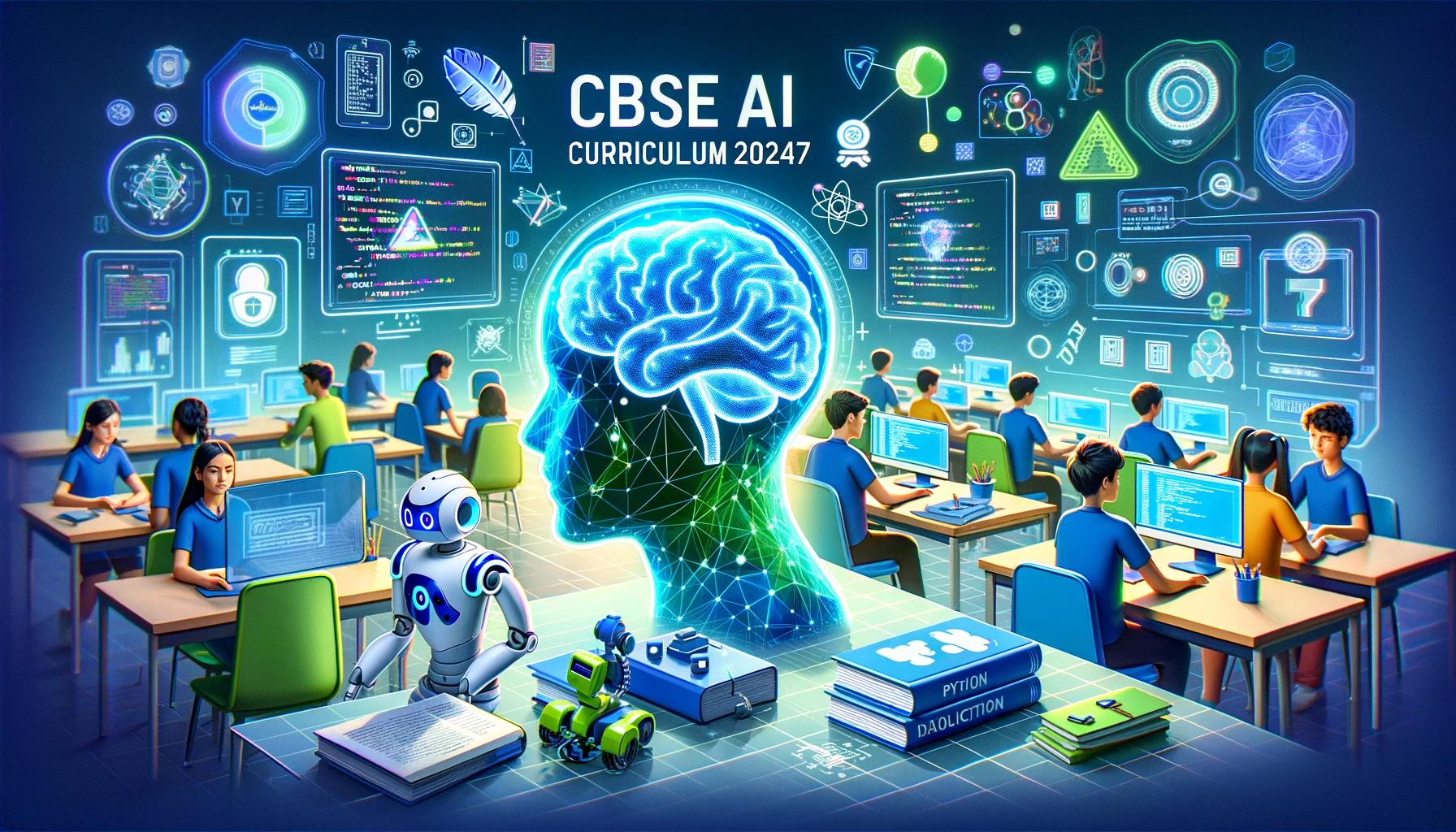Artificial Intelligence (AI) is revolutionizing industries, creating endless opportunities, and shaping the future of work. To equip students with these essential skills, the Central Board of Secondary Education (CBSE) has introduced an AI curriculum for Class X (Code 417) for the 2024-2025 academic session. This curriculum offers a balanced mix of theoretical knowledge, practical applications, and ethical understanding of AI.
In this blog, we’ll explore the details of this AI curriculum and how it prepares students for a technology-driven future.
What is the CBSE AI Curriculum for Class X?
The CBSE Class X AI curriculum focuses on helping students understand the fundamentals of Artificial Intelligence, its real-world applications, and its ethical implications. The program includes practical, project-based learning, and encourages students to develop essential skills like problem-solving, programming, and critical thinking.
Key Objectives of the Curriculum
The main goals of the curriculum include:
- Building AI readiness through interactive and engaging activities.
- Teaching the foundational domains of AI—Data, Computer Vision (CV), and Natural Language Processing (NLP).
- Introducing Python programming in a beginner-friendly manner.
- Developing ethical awareness of AI issues like data privacy and bias.
- Encouraging creativity and innovation through AI-based projects.
CBSE AI Curriculum Structure
The curriculum is structured into four main parts to ensure holistic learning:
1. Employability Skills (Part A)
- Duration: 50 Hours
- Marks: 10
- Topics Covered:
- Communication Skills
- Self-Management Skills
- ICT Skills
- Entrepreneurial Skills
- Green Skills
2. Subject-Specific Skills (Part B)
- Duration: 150 Hours
- Marks: 40
- Topics Covered:
- Introduction to AI: Basics of AI, its applications, and ethical concerns.
- AI Project Cycle: Problem scoping, data collection, data exploration, modeling, and evaluation.
- Advanced Python: Programming fundamentals, libraries, and hands-on coding.
- Data Science: Data visualization, analysis, and exploration using Python libraries.
- Computer Vision (CV): Image processing and feature extraction.
- Natural Language Processing (NLP): Text normalization, chatbots, and sentiment analysis.
- Evaluation: Metrics like accuracy, precision, recall, and F1 score.
3. Practical Work (Part C)
- Components:
- Practical file with 15+ programs on Python, Data Science, and CV.
- Hands-on activities like creating visualizations, analyzing datasets, and building AI models.
- Viva Voce to assess understanding.
- Marks: 35
4. Project Work / Field Visit / Student Portfolio (Part D)
- Components:
- AI projects aligned with Sustainable Development Goals (e.g., student marks prediction or fire detection models).
- Participation in AI exhibitions, bootcamps, and field visits.
- Student portfolios documenting activities and learning.
- Marks: 15
What Makes the CBSE AI Curriculum Unique?
1. Hands-On Learning Approach
Students get practical exposure to tools like Python, NumPy, Pandas, and OpenCV. Activities such as building decision trees, visualizing data, and creating AI models make learning interactive.
2. Ethical AI Awareness
The curriculum emphasizes the importance of addressing AI-related issues such as bias, data privacy, and ethical decision-making. Activities like the “Moral Machine” exercise help students understand the moral dilemmas faced by AI systems.
3. Future-Ready Skills
The course equips students with programming and analytical skills, preparing them for AI-related careers and innovations.
Resources and Tools Required
To support the curriculum, schools need:
- Equipment: Computers with at least Intel i5 processors, 8GB RAM, and Python-friendly setups.
- Software: Anaconda Navigator, Python, OpenCV, and visualization tools.
- Links to Activities: CBSE provides curated resources like Jupyter Notebooks and gamified learning platforms.
Why Students Should Learn AI in School
- Career Opportunities: AI is expected to create millions of jobs globally in fields like data science, machine learning, and robotics.
- Problem-Solving Skills: Students learn to solve real-world problems using AI tools and methodologies.
- Innovation and Creativity: The curriculum encourages students to explore innovative solutions through AI-based projects.
- Global Competitiveness: Early exposure to AI prepares students to thrive in a tech-driven world.
Conclusion
The CBSE Class X Artificial Intelligence curriculum is a forward-thinking initiative to prepare students for a world where AI plays a pivotal role. By combining theoretical knowledge, practical skills, and ethical considerations, this curriculum is setting a new standard for future-ready education.
Whether it’s programming in Python, building an AI model, or analyzing data, this course empowers students with the skills needed to excel in the 21st century.
FAQs about CBSE AI Curriculum (Code 417)
1. What is the duration of the AI course for Class X?
The course includes 210 hours divided into Employability Skills, Subject-Specific Skills, Practical Work, and Project Work.
2. What programming language is taught in the course?
Students learn Python programming, including basic coding, data analysis, and visualization.
3. Are there any practical activities?
Yes, students complete hands-on activities, including building AI models, analyzing data, and working on Python libraries like NumPy and Pandas.
4. How does the course promote ethical AI development?
The curriculum includes sessions on AI ethics, addressing topics like data privacy, bias, and responsible AI usage.
This blog is optimized with keywords like “CBSE Class X Artificial Intelligence Curriculum,” “AI education in schools,” and “CBSE AI syllabus 2024-2025” to enhance SEO performance. Would you like me to assist with social media captions or promotional strategies for this post?


Thanks very nice blog! https://Menbehealth.Wordpress.com/